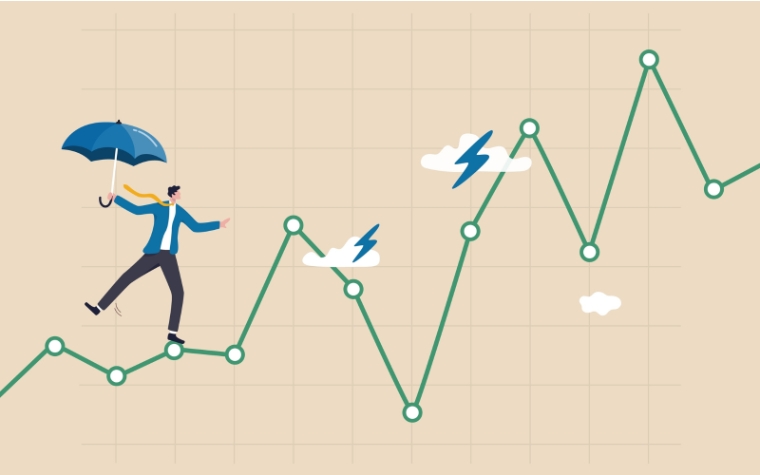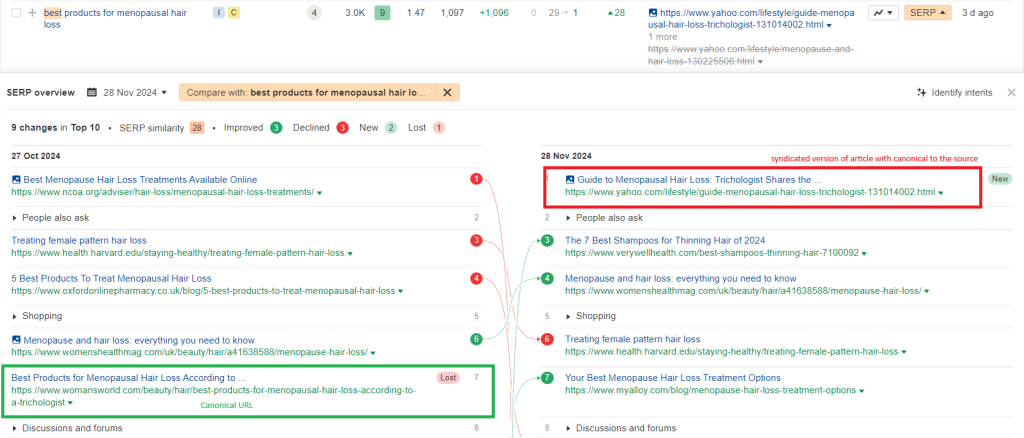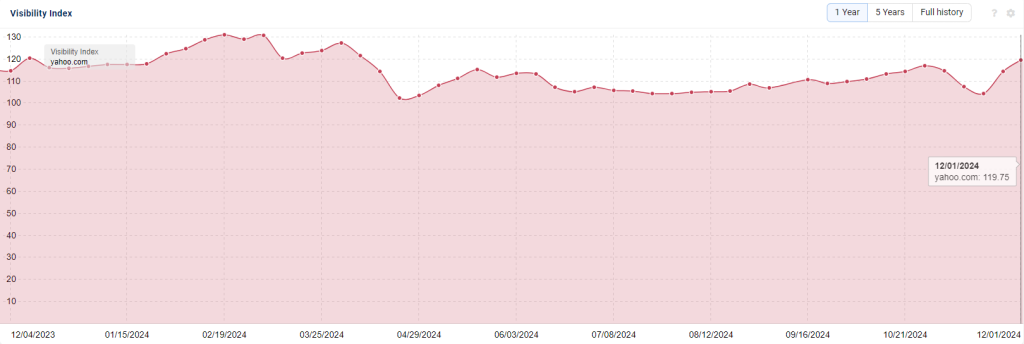
Site Reputation Abuse: Yahoo’s Rise & Syndicated Content Surprises
In recent weeks, many publishers have been hit hard by Google’s Site Reputation Abuse (SRA) penalties, with many questioning the impact of the policy on their rankings and visibility.
Despite the rising scrutiny on manipulated content and unethical SEO practices, it’s strange to see some unexpected outcomes, especially when it comes to Yahoo’s continued dominance and the behavior of syndicated content post-penalty:
– Yahoo is getting even stronger after the core update/SRA penalties
– Some SRA penalized articles still rank well on syndicated partner websites
– It’s not hard to find examples of Yahoo ranking #1 with syndicated content, even when the canonical points to the source*.
In the example below, Google got the canonical right, until it didn’t. Seems like it swapped out the canonical URL for Yahoo after the fact, despite the canonical pointing to the source.




Let’s dive into a few curious points:
1.Yahoo’s Post-Core Update Resilience:
It’s fascinating (and somewhat perplexing) to see Yahoo growing stronger in the wake of recent core updates, despite the increasing penalties surrounding SRA.
While many websites and publishers that engage in manipulative link practices or attempt to artificially boost their reputation have been penalized, Yahoo, a site often criticized for its reputation in the past, seems to be immune—or at least unaffected by—these changes.
This raises a few questions:
- Why is Yahoo benefitting when other sites are penalized for similar practices?
- Could it be that Yahoo’s long-established authority in Google’s eyes provides it with a kind of immunity, despite some of its content syndication practices?
It appears that Yahoo, being a large, authoritative domain, continues to benefit from its massive reach, even if some of its ranking factors may not align with best practices in terms of syndication or content originality. This gives a lot of SEO professionals pause, especially when they see authoritative websites, with questionable syndication practices, rising in the rankings.
2.SRA-Penalized Articles Ranking Well on Syndicated Partner Sites:
One of the strangest things happening is that SRA-penalized articles continue to perform well on syndicated partner websites—even after Google has penalized the original piece for reputation abuse. This makes the current state of SEO feel like an unpredictable game, where Google’s penalization seems inconsistent across the board.
Here’s the thing:
- When an article or website gets hit by an SRA penalty, its rankings drop substantially.
- However, if that same article is syndicated across trusted, authoritative platforms (such as Yahoo, HuffPost, etc.), it often continues to rank well, as though Google is treating the syndicated content as original.
Why does this happen?
- Syndicated sites often carry their own significant authority, andGoogle may prioritize those platforms over the original content, even if the canonical URL points to the original source.
- This raises issues around canonicalization—the process that tells Google which version of a page should rank in the SERPs when content is duplicated or syndicated.
In some cases, even when the canonical is properly set, Google appears to ignore or override it, favoring the syndicated content. This can lead to the original site being penalized, while its syndicated content still benefits from the same article—pushing the question of whether Google’s handling of canonical URLs is flawless.
3.Syndicated Content and the “Canonical” Issue:
This brings us to the next curious point: Google’s handling of canonical URLs. In the example below, Google seemed to have gotten the canonical URL right at first, linking the article back to the original source. However, after some time, Google appears to have swapped the canonical URL to Yahoo’s article, despite the original having the correct canonical tag.
This is troubling for several reasons:
- Canonical issuesaren’t new, but when Google switches the canonical URL without clear reasoning, it leaves both publishers and SEO professionals confused.
- Google’s algorithm appears to befavoring syndicated content over original sources in some instances, even when the canonical link is correctly placed.
This inconsistency raises questions about the effectiveness of canonicalization in the current SEO landscape, and whether Google’s algorithms are keeping up with the intricacies of content duplication and syndication.
The Role of Syndication Guidelines and the “Noindex” Dilemma:
As an SEO professional, I’m all too familiar with the syndication guidelines—and I know that many websites hesitate to ask for a “noindex” tag on syndicated content for fear of losing out on visibility or audience engagement. Publishers are often reluctant to noindex their syndicated content because they worry it will reduce exposure, but in reality, this could be a potential solution to avoid canonical issues and SRA penalties.
While requesting “noindex” or avoiding syndication altogether might seem like an extreme step, it may be necessary for sites that want to ensure their original content isn’t overshadowed by syndicated versions. Yet, this creates friction, especially for large publishers or businesses heavily reliant on content syndication for visibility and traffic.
Here’s the problem:
- If a site syndicates too much contentwithout careful canonical management or “noindex” implementation, it opens itself up to the risk of content dilution, which may impact its overall SEO performance.
- Syndicated content without proper canonical signalsmay not only result in ranking issues but also invite potential penalties for reputation manipulation—whether intentional or not.
Conclusion: Google’s Inconsistent Handling of Syndicated Content & SRA Penalties
The ongoing challenges in SEO, especially regarding Google’s treatment of syndicated content and Site Reputation Abuse penalties, show a system that still has a lot of work to do. While Google’s algorithms and policies are advancing, inconsistencies in canonical handling and penalizing the original source (while allowing syndicated content to perform well) continue to create confusion among publishers.
As it stands:
- Yahoo’s resiliencepost-core update raises questions about how Google weighs authority and syndication.
- SRA penaltiesdon’t always seem to have their intended impact, with syndicated content still ranking, sometimes above the original.
- Canonical issuespersist, and Google’s ability to manage them consistently is still in question.
As SEO professionals, we need to navigate these inconsistencies carefully, especially when it comes to syndicated content. For those who are concerned about being penalized for reputation abuse, implementing clear noindex strategies and making sure canonical tags are correctly set should be top priorities. While the guidelines are well-known, the implementation of these measures can still cause friction, but in the ever-evolving world of SEO, sometimes it’s better to take a step back and rethink syndication strategies to avoid long-term consequences.
Google’s ongoing updates and algorithm shifts mean there’s no one-size-fits-all solution, but by staying ahead of these shifts and adapting to changing SEO landscapes, publishers can better safeguard their rankings and avoid the worst penalties.
- No Comments
- December 3, 2024
